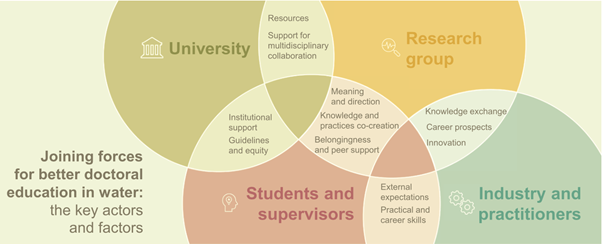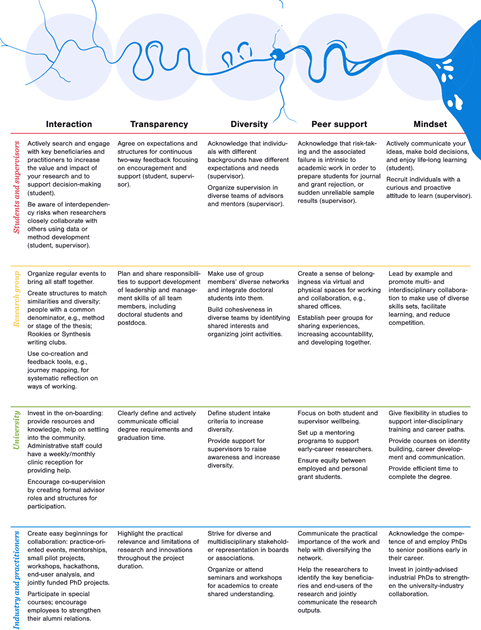Article Review | Making Waves: Joining forces for better doctoral education in water research by Taka, Verbugge, and Varis (2021)

Discussing doctoral programs in water, the publication from Taka et al. (2021) argues for a nuanced and interdisciplinary approach to water education. We are pleased to share that NEWAVE Network was listed as a leading example of such innovative programs. With this in mind, we would like to take this opportunity to reflect on innovative water education aspects based on our network’s experience.
As shown by several authors, current times are characterized by “the greatest array of water challenges in human history” (Taka et al., 2021, p. 1). Additionally, recent doctoral graduates are increasingly employed outside of academia and expected to bridge diverse disciplines in order to arrive at creative as well as sustainable solutions. Hence, Taka et al. maintain that doctoral education in water should ensure future graduates become game changers who, “while excelling in their own specialization, can work across disciplines, drive innovation, engage with stakeholders and lead interdisciplinary teams” (p. 1).
Nonetheless, such doctoral programs tend to operate in isolation. In order to guide the transition towards modernized doctoral education in water research, the authors synthesized key findings from higher education literature and doctoral programs in water to define concrete actions for potential improvement. These action points are targeted at four specific actor groups: (i) supervisors and supervisees; (ii) research group; (iii) university; and (iv) industry (Fig. 1).
The very first step of modernization of doctoral education is the adoption of interdisciplinarity. This signifies that the traditionally encouraged specialization ought to give way to water research that spans multiple disciplines. This key role of interdisciplinarity lies at the center of NEWAVE. NEWAVE is a Marie Skłodowska-Curie Innovative Training Network, bringing together an excellent transnational and transdisciplinary network of water governance organizations that train 15 Early Stage Researchers (ESRs) enrolled in doctoral programs. NEWAVE is rooted in the conviction that the rising threats of future water crises and hydro-social challenges present an urgent need to enhance the global capacity to reflect critically on the current water governance trajectory. We recognize that there is a lack of rigorous interdisciplinary evaluation of water governance approaches, both ex ante and ex post. Additionally, we identify that there is a lack of collaboration between various scientific disciplines, posing a major scientific and transdisciplinary challenge.
Thus, NEWAVE’s innovative contribution to rectifying this scientific gap is our interdisciplinary collaboration between hydrologists, environmental studies scholars, economists, and other social scientists to provide a systematic review of the efficacy of a range of water governance modes. Simultaneously, the network operates as a collaboration between a number of natural and social science disciplines, paying explicit attention in the training program to interdisciplinary and transdisciplinary socio-hydrological approaches.
These innovative contributions can be seen when studying our network structure. Consisting of a transnational and interdisciplinary consortium of over 50 researchers, practitioners, and scholars from as many as 35 partners organizations, NEWAVE unites leading specialists from diverse fields and approaches, with expertise in ecological systems, sustainability, governance, political economy, water and land conflicts, water and climate risk management, irrigation, among many others. From the academic sector, NEWAVE combines a diverse combination of expertise, which greatly enhances the interdisciplinary quality of the training received by the 15 ESRs working in the network. This diversity is also reflected in the vast array of issues examined by the ESRs’ research projects.
Another key theme explored by Taka et al. (2021) is the wellbeing of both the supervisor and supervisee, which can be ensured through the existence of efficient supportive structures, such as timelines and checkpoints. The theme of wellbeing gained additional importance in the context of the COVID pandemic. This is true for our network, as the NEWAVE training and all doctoral activities at the organizations hosting our researchers had to be moved fully online. In no less than two years, since the program started, the vast majority of network members did not manage to meet in person and are still awaiting participation in their first in-person NEWAVE meeting.
In response to the global pandemic, NEWAVE launched its contingency plan, attempting to remain adaptable and resilient in the times of COVID. Meetings and events were moved online, allowing for participation independent of one’s geography. This ended up being highly beneficial for NEWAVE training activities open to the public, such as the “NEWAVE e-Lecture Series: Water Governance Theoretical Perspectives” that proved a great outreach success, receiving more than 1,600 registrations from more than 112 countries.
Apart from the regular activity, NEWAVE strived to ensure that our ESRs had a satisfactory start to their doctoral education. This meant checking that their planned placements and secondments run smoothly, taking into consideration visa requirements, COVID concerns, and challenges that emerged locally. One of the channels launched by NEWAVE is the Virtual Lab 4 (VL4) where the ESRs can (virtually) connect with one another and exchange their experiences, ideas, struggles, and successes in an informal setting. In the annual evaluation of the Network program, the VL4 has been recognized as a safe space by the ESRs, allowing for building a sense of community and support among them.
Finally, Taka et al. (2021) highlight the importance of facilitating the transition from an academic to non-academic working environments, which requires both professional identity-building and marketing doctoral skills in the broader employment field. NEWAVE ensures that each of our ESRs is exposed to an international, interdisciplinary and intersectoral research training, enhancing their cross-cultural competencies and improving their employability. NEWAVE has strong representation from different sectors, such as research-oriented organizations, consultancy international organizations, water utilities and one small-medium enterprise.
NEWAVE nurtures a wide number of connections within the non-academic field. Our non-academic partners belong to both the public and the private sector and work in a variety of fields, bringing expertise in the domain of the EU water framework, urban water management, private capital and water smart technology, global water governance, policy, and more. Partners based in the regions and local sites of the ESRs’ research case studies are aiding them with logistic support, supervision, contacts and guidance. Among the added values of the collaboration with the non-academic supervisors highlighted by our ESRs, co-production in designing the research has received a high recognition, as it allows for the integration of different perspectives and ensures an augmented social impact of the project. The process of co-production plays a central role in our collective research agenda and training activities, ensuring an ESR involvement through all the project’s phases and strengthening a rounded and innovative character of our network. The involvement of the non-academic sector is not limited to our training program. Our partners also participate in NEWAVE’s collective research agenda, contributing to the research work on the Problématiques-Patterns-Paradigms (3Ps) heuristic framework.
Lastly, Taka et al. (2021) identify bottom-up processes involving four actor groups to improve doctoral education in water. These processes fall into five key categories: (i) open mindset; (ii) diversity; (iii) transparency; (iv) interaction; and (v) peer support. The complete roadmap is presented in Figure 2.
In search of ways to transform doctoral education in water from being domain-specific to embracing interdisciplinary and holistic approaches, Taka et al. (2021) conclude their paper with a list of concrete action points. These recommendations aim to create an enabling environment characterized by open mindsets, diversity, transparency, interaction, peer support, and practitioner collaboration. In their words:
- Doctoral students: Be resilient and responsible, commit to your team, your competence development, and for making big changes towards a better world.
- Supervisors: Ensure continuous professional development of all and build a diverse advisory team to co-produce groundbreaking and relevant knowledge.
- Research group: Co-create agile structures to increase interactions and peer support; ensure a community where risk-taking is safe.
- Industry: Harvest opportunities to collaborate through infrastructure, knowledge, and needs; be at the forefront in innovation development and in recruiting PhDs.
- University: Create supporting structures that enable staff to thrive and to get recognition in their diverse tasks; invest in high quality doctoral supervision to engage the best candidates to be trained for future leadership and game changer roles.
(Taka et al., 2021, p. 4)






